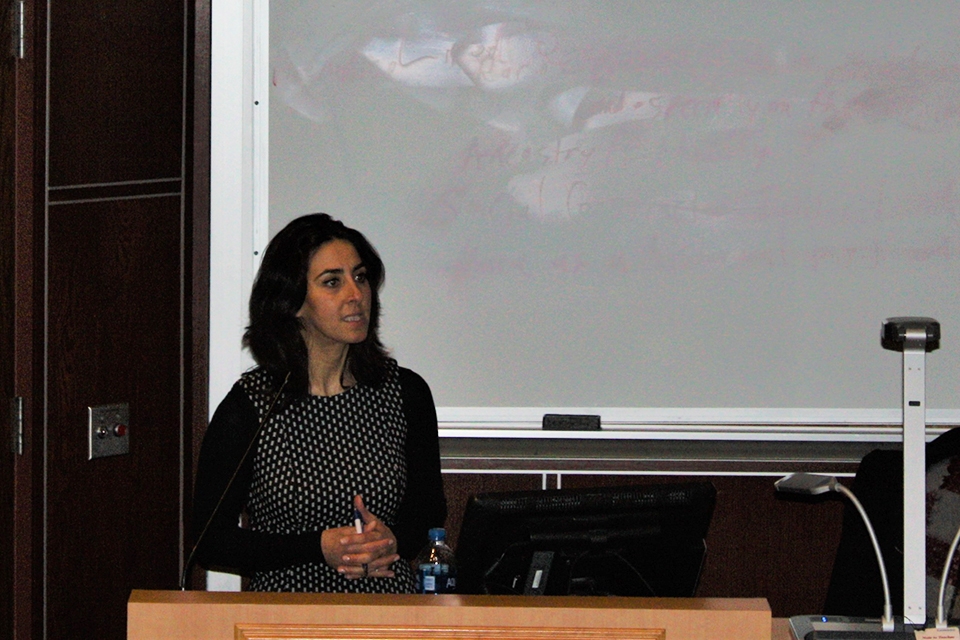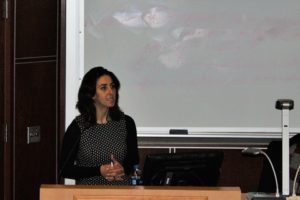
Delaram Farzaneh, Iranian human rights lawyer and scholar, visited Duquesne’s campus on Nov. 29 at 6 p.m. in the Bayer Pappert Lecture Hall.

Delaram Farzaneh, Iranian human rights lawyer and scholar, visited Duquesne’s campus on Nov. 29 at 6 p.m. in the Bayer Pappert Lecture Hall.
Luke Schrum | Staff Writer
12/06/2018
In an effort to expand the perspectives of students and faculty beyond the classroom, Duquesne University’s Department of Political Science, in conjunction with the provost, hosted human rights lawyer and scholar Delaram Farzaneh on Nov. 29 at 6 p.m. for a lecture on women’s rights issues in Iran.
Clifford Bob, professor and chair of the political science department, presented the lecture as a part of his classes.
“[Farzaneh] helped all of us understand the complexity of the discrimination issue, beyond media headlines, as well as problems that could arise from well-meaning outsiders intervening to help Iranian women,” Bob said.
Farzaneh’s book, Judgeships in Iran: Step Down, You Are a Woman – A Legal Analysis of International Human Rights, details the frequent occurrences of human rights violations throughout Iran. In relation to her work and her focus on women’s rights in Iran, Farzaneh wished to maintain a focus on women’s rights to avoid generalizing statements about the country as a whole.
Farzaneh’s research on women’s rights issues in Iran presents a risk to her ability to continue her work, as well as her personal safety. Bob explained how a particular organization helps scholars who are in situations like Farzaneh’s.
“[The] Scholars at Risk network, of which Duquesne is a member, recognizes [Farzaneh] as a threatened scholar. As such, she is someone who has had direct experience with the discrimination facing women in that country – and she has written extensively about the issue,” Bob said.
Organizing the lecture was a hands-on experience for the students taking Bob’s human rights course. The individual chosen to present the lecture would represent a key part of Bob’s course through the perspective of a scholar with direct relation to topic of the human rights issue.
“Farzaneh’s visit was part of the experiential learning component of my human rights class this semester,” Bob said. “Students in the class played a key role in organizing, planning and tabling about her visit.”
Bob described how Farzaneh ultimately was chosen to present a lecture to the Duquesne community. The process involved students researching several scholars at risk and the scholarly work they have completed.
“Student teams made presentations about several [Scholars at Risk], competing to propose the scholar whose visit would best fit with the Duquesne mission, with Farzaneh ultimately being chosen,” Bob said.
A brief question and answer session following Farzaneh’s lecture offered those in attendance the opportunity to learn more about the Scholars at Risk network and how education can prove to be the most powerful tool both for improving and raising awareness of conditions in Iran.
Farzaneh concluded the lecture with a statement on the importance of education and her belief on how to effect change in Iran.
“Change must come through the separation of church and state. It cannot happen while Islamic beliefs influence the government’s decisions,” Farzaneh said.
In reference to the time elapsed since the 1979 Iranian Revolution, “Forty years is plenty of time to say enough is enough,” Farzaneh said.




